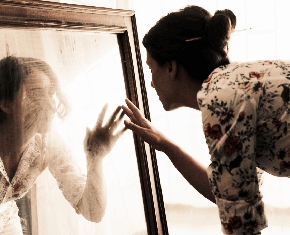The views expressed in our content reflect individual perspectives and do not represent the authoritative views of the Baha'i Faith.
Think back, just for a moment, on the last big decision you made, and ask yourself: Who’s that voice inside my head that helped me make it?
No, you’re not schizophrenic. You do not have multiple personalities. Literally everyone, regardless of their relative level of sanity, hears and converses with an internal voice.
 Some call it the voice of reason. Some say it represents our conscience, or our ego, or our gut instincts. Neurologists and behavioral brain researchers call it “inner speech,” and their research has shown that hearing inner speech is a common everyday experience for everyone. We all have an ongoing internal mental dialogue.
Some call it the voice of reason. Some say it represents our conscience, or our ego, or our gut instincts. Neurologists and behavioral brain researchers call it “inner speech,” and their research has shown that hearing inner speech is a common everyday experience for everyone. We all have an ongoing internal mental dialogue.
The poet and songwriter Leonard Cohen wrote “The voices in my head, they don’t care what I do, they just want to argue the matter through and through.”
This universal, self-generated inner voice has an important role mediating what we think, what we say and what we do. In the process of that inner dialogue, we can learn something important: that we are not our thoughts. Instead, our consciousness observes those thoughts and helps us generate our responses. We think our thoughts, and then our consciousness asks what they mean.
The Baha’i teachings refer to that interior dialogue inside all of us as “consulting our inner reality:”
It is manifest that beyond this material body, man is endowed with another reality … In speaking, man says, “I saw,” “I spoke,” “I went.” Who is this I? It is obvious that this I is different from this body. It is clear that when man is thinking, it is as though he were consulting with some other person. With whom is he consulting? It is evident that it is another reality, or one aside from this body, with whom he enters into consultation when he thinks, “Shall I do this work or not?” “What will be the result of my doing this?” Or when he questions the other reality, “What is the objection to this work if I do it?” And then that reality in man communicates its opinion to him concerning the point at issue. Therefore, that reality in man is clearly and obviously other than his body—an ego with which man enters into consultation and whose opinion man seeks.
Often a man makes up his mind positively about a matter; for instance, he determines to undertake a journey. Then he thinks it over—that is, he consults his inner reality—and finally concludes that he will give up his journey. What has happened? Why did he abandon his original purpose? It is evident that he has consulted his inner reality, which expresses to him the disadvantages of such a journey; therefore, he defers to that reality and changes his original intention. – Abdu’l-Baha, The Promulgation of Universal Peace, p. 463.
So let’s ask the obvious questions: Who is that voice inside my head, anyway? Where does that inner reality come from? Is it me, or is it some disembodied observer, some internal critic? Do I have to listen?
Abdu’l-Baha, the son of Baha’u’llah, the prophet and founder of the Baha’i Faith, advised not only listening to that inner voice, but paying close attention:
This is the conscious reality which discovers the inner meaning of things, for the outer body of man does not discover anything. The inner ethereal reality grasps the mysteries of existence, discovers scientific truths and indicates their technical application. It discovers electricity, produces the telegraph, the telephone and opens the door to the world of arts. If the outer material body did this, the animal would, likewise, be able to make scientific and wonderful discoveries, for the animal shares with man all physical powers and limitations. What, then, is that power which penetrates the realities of existence and which is not to be found in the animal? It is the inner reality which comprehends things, throws light upon the mysteries of life and being, discovers the heavenly Kingdom, unseals the mysteries of God and differentiates man from the brute. Of this there can be no doubt. – Ibid., p. 464.
Our inner reality, the Baha’i teachings say, differentiates us “from the brute.” It “throws light on the mysteries of life and being.” Most importantly, it “discovers the heavenly Kingdom,” and “unseals the mysteries of God …”
Could that inner voice be our soul speaking to us?
In the spiritual world the divine bestowals are infinite, for in that realm there is neither separation nor disintegration, which characterize the world of material existence. Spiritual existence is absolute immortality, completeness and unchangeable being. Therefore, we must thank God that He has created for us both material blessings and spiritual bestowals. He has given us material gifts and spiritual graces, outer sight to view the lights of the sun and inner vision by which we may perceive the glory of God. He has designed the outer ear to enjoy the melodies of sound and the inner hearing wherewith we may hear the voice of our Creator. – Ibid., p. 90.
















Comments
Sign in or create an account
Continue with Googleor